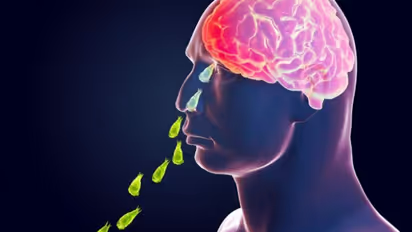Kerala: 10-year-old boy diagnosed with primary amoebic meningoencephalitis in Kollam

Synopsis
Kerala has reported its first case of Primary Amoebic Meningoencephalitis (PAM) in Kollam district, with a 10-year-old boy from Nadutheri, Thalavoor diagnosed with the disease. The child has been transferred to SAT Hospital in Thiruvananthapuram.
Kollam: The state is experiencing a resurgence of amoebic brain fever, with a 10-year-old boy in Kollam district being diagnosed with the disease. The child has been transferred to SAT Hospital in Thiruvananthapuram for treatment. The boy is a native of Nadutheri, Thalavoor in Kollam. This is the first case of PAM in Kollam.
Health officials reported that the boy was first admitted to a hospital in Kollam with symptoms of fever, headache, and vomiting. District health authorities are now investigating whether the child was exposed to any contaminated water sources. Field inspections have already begun in the areas surrounding his home.
The state has reported over 20 cases of PAM so far.
Cases of amoebic encephalitis are being continuously reported in Kerala. Following the outbreak of multiple cases in Thiruvananthapuram, the state Health Minister had announced that the Indian Council of Medical Research (ICMR) would conduct a study. However, this announcement has remained largely on paper. Apart from an ICMR representative meeting with local officials, no further action has been taken. Despite the disease having a 97% fatality rate, the government's response has been criticized for its severe negligence.
According to technical guidelines from the state health department, patients with Primary Amoebic Meningoencephalitis (PAM) often have a history of activities like swimming, diving, bathing, or playing in warm, stagnant freshwater in the 1 to 9 days prior to symptoms appearing. In rare cases, PAM patients may also report experiencing altered senses of smell or taste.
PAM typically progresses rapidly, with symptoms appearing within hours to 1-2 days. Naegleria fowleri, the organism responsible for PAM, quickly reaches the brain via the neuro-olfactory route, bypassing the body's adaptive immune response. This results in an extremely fast disease progression.
Stay updated with the Breaking News Today and Latest News from across India and around the world. Get real-time updates, in-depth analysis, and comprehensive coverage of India News, World News, Indian Defence News, Kerala News, and Karnataka News. From politics to current affairs, follow every major story as it unfolds. Download the Asianet News Official App to stay informed anytime, anywhere.